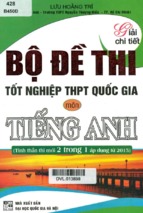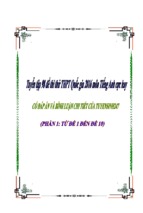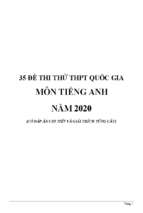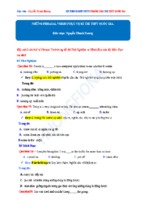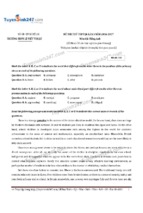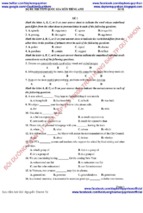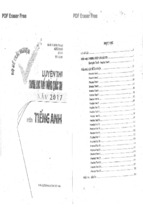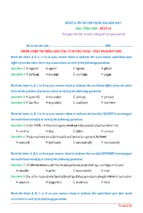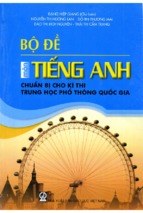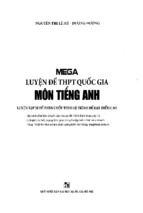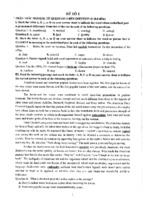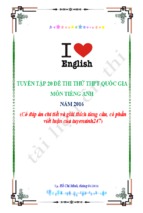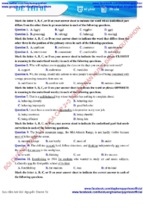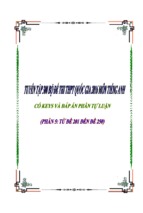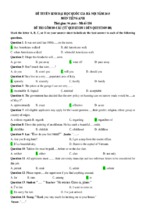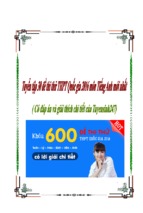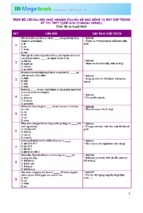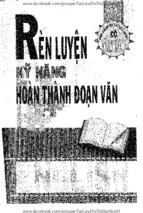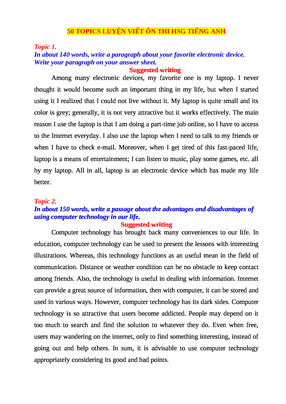ĐỀ THI THỬ SỐ 29
ĐỀ THI THỬ ĐẠI HỌC NĂM 2012
Môn: TIẾNG ANH; Khối D
Thời gian làm bài: 90 phút, không kể thời gian phát đề
ĐỀ THI GỒM 80 CÂU (TỪ QUESTION 1 ĐẾN QUESTION 80)
I. Mark the letter A, B, C, or D on your answer sheet to indicate the word whose underlined
part is pronounced differently from that of the rest in each of the following questions.
Question 1
A. chorus
B. Christian
C. cholesterol
D. check
‘ch’ trong ‘check’ se đươc phát âm thành /tʃ/ trong khi các tư con lai se đươc phát âm là /k/
Question 2
A. clear
B. ear
C. heard
D. near
"ear" trong các câu A, B, và D se đươc phát âm là /iə/ trong khi ‘ear’ trong ‘heard’ se đươc phát
âm là /ɜ:/
Question 3
A. enough
B. rough
C. tough
D. though
‘gh’ trong A, B, C se đươc phát âm là /f/ con trong ‘though’ se không đươc phát âm, hay nói cách
khác, nó là âm câm /ðou/
Question 4
A. hour
B. hear
C. hit
D. hat
‘h’ trong ‘hour’ là 1 âm câm, A se đươc phát âm thành /'auə/ trong khi 3 tư con lai vẫn phát âm
thành /h/
Question 5
A. ache
B. chemist
C. cheerful
D. scholarship
‘ch’ trong ‘cheerful’ se đươc phát âm là /tʃ/ trong khi các tư con lai se phát âm là /k/
II. Mark the letter A, B, C, or D on your answer sheet to indicate the correct answer to each of
the following questions.
Question 6: Physicians can look into the lungs, heart and other areas that were
formerly ............... to them.
A. accessible
B. access
C. accessibly
D. inaccessible
Chỗ trống cần điền một tính tư.
Căn cứ vào nghĩa của câu (bác sĩ có thể kiểm tra phổi, tim và các bô ô phâ ôn mà trước đó họ không
có biê ôn pháp tiếp câ n) =>inaccessible là đáp án đúng
ô
Question 7: Experiments in the sonic imaging of moving objects ............... in both the United
States and Europe well before the Second World War.
A. were conducting
B. have been conducted
C. had been conducted
D. being conducted
Chúng ta có cụm “before the Second World War” là mô ôt sự kiê ôn xảy ra trong quá khứ, hành
đô ng xảy ra trước mô t hành đô ng hay sự kiê n trong quá khứ se đươc chia ở thì quá khứ hoàn
ô
ô
ô
ô
thành.
Ở đây chúng ta có câu ở dang bị đô ông => had been conducted là đáp án đúng
Question 8:............... photosynthesis were to stop, life would disappear from the planet Earth
relatively quickly.
A. For
B. However
C. If
D. Although
Câu trên là câu điều kiê ôn loai 2 dùng trong diễn tả hành đô ông không có thực trong hiê ôn tai =>
câu trả lời đúng se là if
Question 9:What did you do this morning? – We …………the room white-washed.
A. had
B. have
C. got to
D. order
Chúng ta có cấu trúc cố định “have something + PII”
Ở đây câu hỏi đă ôt ra ở thì quá khứ => câu đúng se là “had the room white-washed”
Question 10: Will you ……… me a favor?
A. make
B. do
C. give
D. call
“do somebody a favor” có nghĩa là giúp đỡ ai đó = “give somebody a hand”
Question 11: Who will go with us? – The man ……… to Mary.
A. talking
B. to talk
C. talks
D. is talking
Chúng ta sử dụng câu giản lươc ở trường hơp này.
“The man who is talking to Mary = The man talking to Mary”
Question 12: Neither heat or cold ………the postman.
A. daunts
B. daunt
C. daunting
D. to daunt
Với câu có “neither S1 nor S2” chúng ta se chia đô ông tư theo chủ ngữ 2 đứng ngay trước đô ông
tư, vì trong câu chủ ngữ 2 là “cold” chúng ta se chia đô ông tư theo số ít, do đó, “daunts” là đáp án
đúng
Question 13: Do you think the book is expensive? – Yes, it’s not ………. what we paid for it.
A. worthy
B. worth of
C. worth
D. valuable
Chúng ta có “to be worth + something/ doing something” có nghĩa là đáng giá cái gì hay đáng
giá làm cái gì. (trong câu trên: Bạn có nghĩ là quyển sách quá đắt ko? – Ừ, nó không đáng số
tiền mà mình đã trả để mua nó)
Question 14: He works ………. the government.
A. to
B. for
C. in
D. with
Chúng ta có “work for” với ý nghĩa làm viêc cho tổ chức hay công ty nào.
ê
Question 15: ............. children master the basics, advanced development becomes easier.
A. The
B. Once
C. That
D. Even
Dựa vào ý nghĩa của câu chúng ta chọn “once” (mô t khi).
ô
Câu trên có nghĩa là: Mô êt khi trẻ em nắm được cơ bản, phát triển nâng cao trở nên dễ dàng hơn.
Question 16: The wheel, ............. has remained important for 4,000 years, is one of mankind's
first inventions.
A. how
B. when
C. which
D. about
Ở đây chúng ta dùng đai tư quan hê ô thay thế cho chủ ngữ trong câu là “The wheel”, đai tư quan
hê ô phải dùng ở đây se là “which”.
Question 17: Sometimes ............. wears people out and is worse than the lack of sleep itself.
A. sleep the desire
B. the desire to sleep
C. to desire sleep is
D. the desire sleep
Cụm tư cần điền trong câu làm chủ ngữ trong câu, do đó đúng ngữ pháp chỉ có cụm “the desire
to sleep”
Question 18: Some of the rainwater from clouds evaporates before .............. .
A. reaching the ground
B. to reach the ground
C. reach the ground
D. the ground reaches
Sau giới tư, đô ông tư luôn để dang V-ing, do đó, câu trả lời đúng se là “reaching the ground”
Question 19: A log grabber has a long arm ............., which stretches out to pick up logs.
A. calls a jib
B. calling a jib
C. called a jib
D. call a jib
Chúng ta sử dụng câu giản lươc ở đây
Câu giản lươc có dang V-ing với câu chủ động hoă c V-ed với câu bị đô ng => chúng ta có dang
ô
ô
đầy đủ của câu trên là “A log grabber has a long arm which is called a jib” se đươc giản lươc
thành “A log grabber has a long arm called a jib”
Question 20: It can sometimes ............. a house.
A. to take months to sell
B. take several months to sell
C. selling takes several months
D. to sell taking several months
Trong câu trên chúng ta thấy có sự xuất hiê n của “can” sau nó se là mô t đô ng tư nguyên thể, do
ô
ô
ô
đó chỉ có đáp án B là chính xác.
Question 21: ............. of commodities by air began in the 1920s at the same time as airmail
service.
A. The shipping
B. A ship
C. The shipped
D. To ship
Tư con thiếu trong câu là chủ ngữ của câu, do đó cần điền 1 danh tư, căn cứ theo nghĩa của câu
(chuyên chở hàng hóa theo đường hàng không….) chúng ta loai bỏ “a ship” ( 1 con tàu), “the
shipped” và “to ship”, đáp án đúng là 1 danh đô ông tư “The shipping” (sự chuyên chở).
Question 22: The student worked…………a barman during his holidays.
A. at
B. as
C. like
D. as if
“work as” là cấu trúc cố định có nghĩa là làm công viê ôc gì
Question 23: I just can’t …………the winter so I can go skiing again.
A. wait for
B. look forward to
C. expect
D. await
Dựa vào nô ôi dung trong câu (Tôi không thể đợi đến mùa đông để lại được đi trượt tuyết) câu trả
lời đúng se là “wait for”
Question 24: He has been out of work ……….a long time.
A. during
B. since
C. for
D. through
Trong câu sử dụng thì hiê ôn tai hoàn thành, chúng ta có “since + mốc thời gian trong quá khứ”
hoă c “for + khoảng thời gian” => lựa chọn đúng là “for”
ô
Question 25: If we want to buy a house, we’ll have to ………our spending.
A. care for
B. cut back
C. let down
D. miss out
Theo nô ôi dung của câu (Nếu chúng ta muốn mua nhà, chúng ta sẽ phải cắt giảm chi phi) => lựa
chọn đúng chính là “cut back” ( “care for” :quan tâm đến, “let down”: làm cho thất vọng, “miss
out”: bỏ lỡ)
Question 26: We are constantly being …………of the problems of overpopulation.
A. reflected
B. reminded
C. remembered
D. reviewed
Theo nghĩa của câu (Chúng tôi thường xuyên bị nhắc nhở về vấn đề bùng nổ dân số)
Có cấu trúc cố định “remind sb of sth” có nghĩa là nhắc nhở về => câu trả lời đúng là
“reminded”
Question 27: He fell …….. his best friend over a girl they both like.
A. over
B. down
C. out with
D. off
Cụm tư cố định “fall out with sb ” ( bất hoa với ai)
Question 28: Look, officer. I’m not drunk. I’m as …… as a judge.
A. calm
B. steady
C. clear
D. sober
Chúng ta có thành ngữ “ as sober as a judge” tương tự với “tỉnh như sáo” trong tiếng Viê ôt
Question 29: There’s …….. use in complaining. They probably won’t do anything about it.
A. a few
B. a little
C. few
D. little
Chúng ta sử dụng “little/few” trong câu khẳng định để diễn đat mô ôt ý phủ định mang nghĩa là có
quá ít để thực hiê ôn cái gì đó. Trong câu trên, chúng ta sử dụng “little” với danh tư không đếm
đươc là “use” với ý nghĩa Không có tác dụng trong viêc phàn nàn. Họ có lẽ sẽ chả làm gì với nó
ê
cả
Question 30: If it’s raining tomorrow, we’ll have to ………….. the match till Sunday.
A. put off
B. cancel
C. play
D. put away
Ở đây theo nghĩa của câu (Nếu ngày mai mưa, chúng ta sẽ phải hoãn lại trâ ên đấu đến chủ nhâ êt)
chúng ta loai bỏ “cancel” (hủy trâ ôn đấu), “play” (chơi), “put away” (bỏ sang 1 bên, bỏ đi)
Lựa chọn đúng se là “put off” (hoãn lai)
III. Mark the letter A, B, C, or D on your answer sheet to show the underlined part that needs
correction in each of the following questions.
Question 31: If a rash occurs within twenty-four hours after taking a new medication, the
treatment should discontinued.
A. occurs
B. after taking
C. medication
D. should discontinued
Với câu này, chúng ta se phải chia ở dang bị đô ông => ‘should discontinued’ se đươc chuyển
thành ‘should be discontinued’
Question 32: Almost all life depends to chemical reactions with oxygen to produce energy.
A. almost all
B. depends to
C. to produce
D. energy
Chúng ta có cụm ‘depend on’ (có nghĩa là ‘dựa vào’) => ‘depends to’ se phải chuyển thành
‘depends on’
Question 33: If dinosaurs would have continued roaming the earth, man would have evolved
quite differently.
A. would have
B. roaming
C. man
D. differently
Chúng ta sử dụng câu điều kiê ôn loai 3 trong câu trên để diễn tả mô ôt sự kiê ôn không có thâ ôt trong
quá khứ.
Quy tắc câu điều kiê ôn loai 3: If + S+ had + PII + O, S + should have + PII + O.
=> Trong câu trên trong mê ônh đề if, chúng ta se chuyển ‘would have’ sang thành ‘had’
Question 34: Find in 1933, The New York Sun was the first successful penny newspaper.
A. Find
B. was
C. the first
D. newspaper
Câu trên là câu có rút gọn chủ ngữ trong trường hơp câu có chung chủ ngữ ‘The New York Sun’
=> chúng ta se chia dang bị đô ông, ‘Find’ se chuyển thành ‘Found’ (Được thành lâ êp vào năm
1933, The New York Sun là tờ báo lá cải đầu tiên thành công)
Question 35: George is not enough intelligent to pass this economics class without help.
A. enough intelligent
B. to pass
C. this
D. economics
Chúng ta có: - enough + N
- adjective + enough
=> câu sai là A, để sửa lai, chúng ta chuyển ‘enough intelligent’ thành ‘intelligent enough’
IV. Mark the letter A, B, C, or D on your answer sheet to indicate the word or phrase that is
closest in meaning to the underlined part in each of the following questions.
Question 36: The wagon master decided to ford the stream.
A. valley
B. mountain
C. small river
D. plain
Stream (n): dong sông/ suối nhỏ = small river
Valley (n): thung lũng
plain (n) : đồng bằng
Question 37: Saint Elmo's Fire is a Phenomenon that occurs when ships discharging harmless
electrical charges into the atmosphere appear to shine.
A. fade
B. shrink
C. glow
D. vanish
Shine (v) : tỏa sáng = glow
Fade (v) : mờ nhat đi
Shrink(v) : co rút lai
Vanish (v) : biến mất
Question 38: The high mountain climate is cold and inhospitable.
A. rainy
B. stormy
C. uninviting
D. intense
Inhospitable (adj) : không thể ở/ cư trú, không chào đón= uninviting
Rainy (adj): hay mưa
Stormy (adj): có bão
Intense (adj) : dữ dô ôi
Question 39: The tornado caused irreparable damage to the Florida citrus crop.
A. irresolute
B. irresponsible
C. irrecoverable
D. irregular
Irreparable (adj): không thể khắc phục = irrecoverable
Irresolute (adj): do dự, phân vân
Irresponsible (adj): không có trách nhiê ôm
Irregular (adj): không đều
Question 40: A female mosquito produces between 100 and 300 eggs at a time and up to 3,000
eggs during her lifetime.
A. at once
B. one by one
C. once in a while
D. off and on
At a time: mô ôt lúc = at once
One by one: tưng cái mô ôt
Once in a while: mỗi lần 1 cái
Off and on: lúc có lúc không
Theo nghĩa của câu (Muỗi cái đẻ từ 100 đến 300 trứng 1 lúc và đẻ lên tới 3000 trứng trong suốt
vòng đời muỗi cái) chúng ta chọn “at once”
V. Choose the best answer A, B, C or D to complete the following sentences.
Question 41: Don't invite John to dinner; I can't stand his bad ………… .
A. mood
B. mind
C. character
D. temper
Ở đây chúng ta chọn D. temper (bad temper: tính khí không tốt)
Mood (n) : tâm trang
Mind (n) : tâm trí
Character (n) : nhân cách
Question 42: It was a magnificent car which must have belonged to a very ………..person.
A. plentiful
B. wealthy
C. expensive
D. luxurious
Căn cứ theo nô ôi dung câu (Chiếc xe lô êng lẫy này chắc phải thuô êc về mô êt người rất giàu có)
chúng ta loai bỏ các đáp án “plentiful” (dồi dào), “expensive” (đắt), “luxurious” (xa xỉ) => đáp
án đúng là “wealthy” (giàu có)
Question 43: Heavy snowfalls have ………. all trains.
A. cancelled
B. postponed
C. delayed
D. omitted
Căn cứ theo nghĩa của câu (Tuyết rơi dày đã trì hoãn tất cả các chuyến tàu) chúng ta loai bỏ
“cancelled” , “omitted” (hủy bỏ)
Với hành trình của tàu xe, nói đến trì hoãn hành trình chúng ta sử dụng “delayed”
Question 44: He spent ten years in the army and for most of the time he was …………..abroad.
A. camped
B. situated
C. placed
D. stationed
Chúng ta có “camped” (đă ôt lều trai), “situated”/ “placed” ( đươc đă ôt ở), riêng với “stationed”
(đóng quân), vì mê ônh đề phía trước có thông tin anh ta ở trong quân đô ôi 10 năm, nên trong câu
này đáp án đúng se là D.
Question 45: This is a challenging position in the car industry for a qualified …………
A. engineer
B. engine
C. mechanical
D. machinery
Nghĩa của câu: “Đây là mô êt vị tri đầy thử thách trong ngành công nghiêp xe hơi đối với mô êt…..”,
ê
tư con thiếu phải điền se là mô ôt chức vụ nghề nghiê ôp và chỉ có “
engineer” (kỹ sư) là thỏa mãn.
Question 46: His first novel was much more exciting ……….. any he has written since.
A. to
B. as
C. so
D. than
Chúng ta thấy ở đây có sự xuất hiê ôn của “more” cho thấy đây là câu so sánh hơn, do đó tư con
thiếu trong chỗ trống se là “than”
Question 47: Jane and Margaret …………..to live next door to each other at one time.
A. had used
B. used
C. were used
D. have used
Chúng ta có dấu hiê ôu “at one time” ở đây là chỉ hành đô ông tưng xảy ra trong quá khứ, do đó cấu
trúc sử dụng trong câu trên se là “used to +V”
Question 48: There is a large car-park ………… to the station.
A. across
B. by
C. close
D. right
Dựa vào nghĩa của câu : “Có mô êt bãi đỗ xe lớn ở gần nhà ga” câu đúng se là “close” (gần) mà
không phải “across” (ngang qua), “by” (chúng ta không có “by to/ across to”), hay “right” ( ngay
tai)
Question 49: Food prices have been ………….. steadily for at least twenty years.
A. rising
B. raising
C. lifting
D. growing
- Đối tương trong câu là “food prices” (giá đồ ăn) tăng lên, chúng ta không dùng đô ông tư
“growing” (lớn lên), hay “lifting” (nâng lên).
- Với “rising” và “raising”, “raising” là mô ôt ngoai đô ông tư, sau nó se phải có tân ngữ, “rising”
ngươc lai là mô ôt nô ôi đô ông tư, nó se đứng 1 mình hoă ôc có trang ngữ đi kèm
=> đáp án đúng là “rising”
Question 50: According to the ……………..of the contract, tenants must give six months notice
if they intend to leave.
A. laws
B. rules
C. terms
D. details
Ở đây chúng ta thấy xuất hiê n “contract” (hơp đồng), do đó, phải căn cứ theo điều khoản
ô
(terms) chứ không phải luâ ôt pháp (laws), quy tắc (rules), hay chi tiết (details).
=> “terms” là đáp án đúng
VI. Read the following passage and mark the letter A, B, C, or D to indicate the correct
answer to each of the questions.
Martin Luther King, Jr., is well known for his work in civil rights and for his many famous
speeches, among them is his moving "I Have A Dream" speech. But fewer people know much
about King's childhood. M.L., as he was called, was born in 1929 in Atlanta, Georgia, at the
home of his maternal grandfather.
M.L.'s grandfather, the Reverend A.D. Williams, purchased their home on Auburn Avenue in
1909, twenty years before M.L. was born. The Reverend Williams, an eloquent speaker, played
an important role in the community since so many people's lives centered around the church. He
allowed his church and his home to be used as a meeting place for a number of organizations
dedicated to the education and social advancement of blacks. M.L. grew up in this atmosphere,
with his home being used as a community gathering place, and was no doubt influenced by it.
M.L.'s childhood was not especially eventful. His father was a minister and his mother was a
musician. He was the second of three children, and he attended all- black schools in a black
neighborhood. The neighborhood was not poor, however. Auburn Avenue was the main artery
through a prosperous neighborhood that had come to symbolize achievement for Atlanta's black
people. It was an area of banks, insurance companies, builders, jewelers, tailors, doctors,
lawyers, and other black-owner black-operated businesses and services. Even in the face of
Atlanta's segregation, the district thrived. Dr. King never forgot the community spirit he had
known as a child, nor did he forget the racial prejudice that was a seemingly insurmountable
barrier that kept black Atlantans from mingling with whites.
Question 51: What is this passage mainly about?
A. the prejudice that existed in Atlanta
B. Martin Luther King's childhood
C. M.L.'s grandfather
D. the neighborhood King grew up in
Các câu A, C, D chỉ là mô ôt ý trong cả bài, chỉ có B khái quát đươc nô ôi dung cả bài, bài văn trên
xoay quanh thời niên thiếu của Martin Luther King.
Question 52: The word "eloquent" means most nearly
A. powerful
B. active
C. romantic
D. fascinating
“The Reverend Williams, an eloquent speaker, played an important role in the community since
so many people's lives centered around the church”
Chúng ta thấy trong câu vì đời sống người dân tâ p trung xoay quanh nhà thờ và giáo hô ôi, người
ô
diễn thuyết có vai tro quan trọng trong cô ông đồng => chúng ta có thể suy ra vị trí này nắm giữ
quyền lực, do đó, “powerful” se là đáp án đúng.
Question 53: The word "gathering" in line 10 could best be replaced by
A. picking
B. learning
C. exciting
D. meeting
Để trả lời câu hỏi này chúng ta phải nhìn lai câu trước đó cùng với câu chứa nó “He allowed his
church and his home to be used as a meeting place…… with his home being used as a
community gathering place”
Ta có thể thấy đươc “gathering” se tương đương với “meeting” ( “nơi tụ tâ ôp” thì tương đương
với “nơi họp”)
Question 54: In line 16, the word "it" refers to which of the following?
A. achievement
B. neighborhood
C. services
D. segregation
Dựa vào 2 câu trước đó ta có thể kết luâ ôn “it” ở đây là chỉ “neighborhood”
Question 55: According to the author, blacks in King's neighborhood were involved in all the
following businesses and services EXCEPT
A. dentistry
B. medicine
C. law
D. banking
“It was an area of banks, insurance companies, builders, jewelers, tailors, doctors, lawyers, and
other black-owner black-operated businesses and services”
Chúng ta thấy trong câu đề câ ôp tới “banks”, “lawyers”, “doctors” mà không đề câ p gì tới
ô
“dentistry” => A là đáp án đúng.
Question 56: According to the author, King was influenced by
A. community spirit
B. black lawyers
C. his mother
D. his speeches
Chúng ta có “Dr. King never forgot the community spirit he had known as a child” (Dr King
chưa bao giờ quên cái tinh thần cô ông đồng mà ông đã tiếp câ n tư hồi con bé). Do đó có thể kết
ô
luâ ôn A là đáp án đúng
Question 57: The word "thrived" in line 18 refers to which of the following?
A. achieved
B. surrendered
C. flourished
D. held
Chúng ta có “thrive” (phát triển/ thịnh vương) = flourish (v)
Achieve (v): đat đươc
Surrender (v): đầu hàng
Hold (v): giữ nguyên
Question 58: As used in line 19, which of the following is closest in meaning to the word
"seemingly"?
A. apparently
B. inevitable
C. inexplicable
D. hastily
Seemingly (dường như) = apparently (adv)
Inevitable (adj): không thể tránh khỏi
Inexplicable (adj): không thể giải thích đươc
Hastily (adv): hấp tấp/ vô ôi vàng
Question 59: The word "mingling" in line 26 could best be replaced by which of the following?
A. interfering
B. gargling
C. consuming
D. associating
Mingle (lẫn vào, tiếp xúc) = associate (v)
Interfere (v): gây phiền phức
Consume (v): tiêu thụ
Question 60: According to the author, M.L.
A. had a difficult childhood
B. was a good musician as a child
C. loved to listen to his grandfather speak
D. grew up in a relatively rich area of Atlanta
Chúng ta có thể dùng phương pháp loai trư:
- A: đoan văn có câu “M.L.'s childhood was not especially eventful” ( tuổi thơ của M.L không
phải đă ôc biê ôt thăng trầm), phía sau có mô ôt loat các thông tin khác bổ trơ => A không chính xác
- B: trong đoan chỉ nhắc đến M.L có mẹ là nhac sĩ chứ không nhắc đến anh ta có phải là nhac sĩ
khi con nhỏ hay ko.
- C: trong đoan văn cũng ko nhắc đến viê ôc anh ta thích nghe người ông nói chuyê ôn.
=> D là đáp án đúng, có thể nhìn vào đoan cuối miêu tả vùng quê mà anh ta lớn lên
VII. Read the following passage, and mark the letter A, B, C, or D on your answer sheet to
indicate the correct word for each of the blanks.
You have probably never heard of Charles Burgess Fry but in the early years of this century,
he was the most famous while still at university, mainly on ……(61)….of his achievements in
sport. He was, at the same time, captain of the university football, and athletics teams and ……
(62)……the world record for the long jump. He was also a……(63).... sports journalist. He was
so famous that letters addressed to Mr Fry, Oxford were …(64)……..to him without any
difficulty. His college, ……(65)………it had quite a different name, was known as “Fry”
college.
Some people have ……(66)…..Fry’s sporting achievements. They …(67)….out that he lived
at a time when standards were quite ……(68)…… and it was much easier to do well in several
sports. It is certainly true that athletes of that time did not have the totally dedicated approach of
modern athletes. However, it is only fair to judge him……(69)…… the standards of his own
time. There is no doubt that he had extraordinary skill……(70)….with an ability to write about
sport with style and intelligence.
Question 61:
A. case
B. account
C. view
D. regard
Chúng ta có cụm “on account of + N"(bởi……)
Question 62:
A. held
B. did
C. made
D. reached
Theo nghĩa của câu “giữ kỉ lục thế giới” nên ở đây se là “held the world record” chứ không thể
là “do”/ “make” (làm), hay “reach” (đat đến)
Question 63:
A. common
B. usual
C. normal
D. popular
Popular (adj): nổi tiếng/ đươc yêu thích
Normal (adj): bình thường
Common (adj): thông thường
Usual (adj): như thường
Question 64:
A. posted
B. diverted
C. delivered
D. carried
Theo nghĩa của câu ở đây là “thư tín se đươc chuyển đến”, ta se dùng đô ông tư “deliver” (chuyển
giao) ở đây.
Post (v): đăng lên
Divert (v): chuyển hướng
Carry (v): mang, cầm
Question 65:
A. despite
B. although
C. however
D. otherwise
Despite: mă ôc dù (+ Noun phrase/ V-ing)
Although: mă ôc dù (+ clause (mê nh đề))
ô
However: tuy nhiên
Otherwise: mă ôt khác
Căn cứ vào nghĩa của tư và cách sử dụng ta thấy đáp án đúng ở đây là “although”
Question 66:
A. complained
B. contradicted
C. criticized
D. contrasted
Complain (v): phàn nàn
Contradict (v): mâu thuẫn, đối nghịch
Criticize (v): phê phán, chỉ trích
Contrast (v): tương phản, làm trái
Căn cứ vào nghĩa của tư, chúng ta thấy đươc “criticized” se là phương án đúng.
Question 67:
A. point
B. give
C. put
D. speak
Chúng ta có cụm “point out” (chỉ ra) khi muốn củng cố mô ôt ý kiến nào trước đó, do đó A se là
đáp án đúng trong câu.
Question 68:
A. bad
B. small
C. low
D. weak
Ở đây chúng ta nói về “standard” (tiêu chuẩn), do đó, chỉ có thể đi với tính tư “low” ở đây với ý
nghĩa “tiêu chuẩn thấp” mà không thể dùng “bad/ small/ weak”.
Question 69:
A. for
B. by
C. as
D. with
Chúng ta có cấu trúc “judge somebody by something” với nghĩa là “xét đoán ai đó bằng cái gì”
Question 70:
A. attached
B. combined
C. connected
D. related
Ở đây chúng ta dùng cụm tư “combined with” với ý nghĩa “kết hơp với”, loai bỏ các đáp án
khác do chúng không đi với giới tư "with"
IX. Read the following passage and mark the letter A, B, C, or D on your answer sheet to
indicate the correct answer to each of the questions from 71 to 80.
The peregrine falcon, a predatory bird indigenous to North America, was once in danger of
extinction. In the 1960s, scientists discovered byproducts of the pesticide DDT in the birds' eggs,
which caused them to be too soft to survive. The use of the pesticide had been banned in the
United States, but the falcons were eating migratory birds from other places where DDT was still
used. In order to increase the survival rate, scientists were raising the birds in laboratories and
then releasing them into mountainous areas. This practice achieved only moderate success,
however, because many of the birds raised in captivity could not survive in the wild.
There is now, however, a new alternative to releases in the wild. A falcon that has been given
the name Scarlett chose to make her home on a ledge of the 33rd floor of a Baltimore, Maryland,
office building rather than in the wild, and, to the surprise of the scientists, she has managed to
live quite well in the city. Following this example, programs have been initiated that release birds
like Scarlett into cities rather than into their natural wild habitat. These urban releases are
becoming a common way to strengthen the species. Urban homes have several benefits for the
birds that wild spots do not. First, there is an abundance of pigeons and small birds as food
sources. The peregrine in the city is also protected from its main predator, the great horned owl.
Urban release programs have been very successful in reestablishing the peregrine falcons along
the East Coast. Though they are still an endangered species, their numbers increased from about
60 nesting pairs in 1975 to about 700 pairs in 1992. In another decade the species may flourish
again, this time without human help.
Question 71: What is the main topic of the passage?
A. survival of peregrine falcons
B. releases into the wild
C. endangered species
D. harmful effects of pesticides
B, C, D đều là các ý nhỏ trong bài, nô ôi dung của bài ở đây nói về sự sinh tồn của loài chim cắt
này, do đó, A là đáp án đúng.
Question 72: In line 1, the phrase “indigenous to” could be bet replaced by
A. typical of
B. protected by
C. adapted to
D. native to
Chúng ta có “indigenous to” có nghĩa là “bản xứ tai”
Typical of: tiêu biểu cho
Protected by: đươc bảo vê ô bởi
Adapted to: thích nghi với
Native to: bản xứ tư/ xuất xứ tư
=> D là đáp án đúng.
Question 73: The word “byproducts” could be best replaced by which of the following?
A. derivatives
B. proceeds
C. chemicals
D. elements
Chúng ta có “byproduct” (sản phẩm phụ) = derivative
Proceed (n): lãi
Chemical (n): chất hóa học
Element (n): nguyên tố
Question 74:The word “banned” could be best replaced by
A. authorized
B. developed
- Xem thêm -

